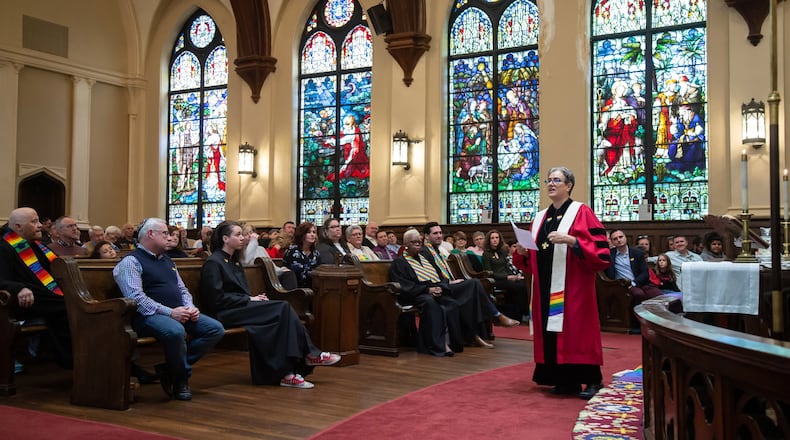Progressive United Methodists in Midtown and traditional Methodists in Marietta had emotionally filled services on Sunday, just days after a special session of the denomination's General Conference voted to uphold opposition to same-sex marriage and the ordination of non-celibate LGBTQ clergy.
At St. Mark United Methodist Church in Midtown, ushers handed out heart-shaped stickers in the rainbow colors that symbolize gay pride. Members wore similarly colored scarves, socks, ties and large key chains hanging from their belts.
Guests included former pastors, a rabbi, members and Sue Haupert-Johnson, presiding bishop of the North Georgia Conference of the United Methodist Church.
Haupert-Johnson said “exclusion in the name of the Bible must stop” and when the Word is used in “ways that do not reflect Christ, we must speak out.” She said she doesn’t know how people can read the Gospels and not know that Christ worked with people who were marginalized or deemed by others to be unfit or not acceptable.
“Sadly, I follow a long line of bishops who have had to speak out in the name of the church against injustice and oppression,” she said. “When biblical literalism excludes, it must be retaught.”
The front of the bulletin included a photo of a tree with strong, intertwined roots. “Like a tree, planted by the water, we shall not be moved,” it read. The choir sang “All Are Welcome” and “Draw the Circle Wide.”
Nearly 20 miles away, at Mount Bethel United Methodist Church in Marietta, Senior Pastor Jody G. Ray injected a note of levity before his sermon became fraught with emotion.
“The only way you don’t really know what’s going on in the Methodist church right now is if you’ve been living under a rock or if you’re a Baptist here today,” he quipped.
He delivered the rest of his remarks in a voice that at times trembled, and he paused more than once to wipe away tears as he talked about the General Conference special session, where “our long-held Scriptural understanding of marriage was once again affirmed. This is basically the same belief that Methodists have held since (our) beginnings. It’s the same theological position this church has held for over 175 years. If you listen to the media and some pastors from around the country, you will hear words like hateful, harmful and unloving. I’ve never heard a traditional Methodist church say to gay people that God doesn’t love them. That may be what they hear through our policy, but that is not our message, nor our intent.”
The debate has threatened to split the church. Currently, United Methodists represent one of the largest mainline denominations with more than 12 million members worldwide, including almost 7 million in the U.S and more than 467,000 United Methodists in Georgia.
Even at indivudal churches, though, some of the members may disagree, and one can't paint a congregation with broad strokes. United Methodists on both sides of the issue likely with stay with the church as a sign of their faith.
Retiree Phil Hulst has been a member of St. Mark for more than two decades and plans to stay.
“St. Mark has always been on the edge of social justice and we’re not going to give up the fight.”
Several congregations displayed their viewpoints on their church marquees.
The marquee at East Cobb United Methodist Church on Roswell Road, for instance, read “All ARE WELCOME HERE” with the word welcome in the pride colors and on the other said “GOD LOVES YOU.”
At Level Creek United Methodist Church in Suwanee the sign said:
“GOD DOES NOT EXCLUDE
NEITHER DO WE
ALL ARE WELCOME HERE”
Mount Pisgah United Methodist Church Lead Pastor Steve Wood was a delegate to the called session and was dismayed at the acrimony and vitriol he found on display.
“Hurt people say hurtful things. Hurt people act in hurtful ways,” he said. “But hurt people are also children of God.”
He told his Johns Creek congregation that “the church’s historic teaching on marriage was affirmed” before moving on to what else did not change: “All people are of sacred worth. All people are of sacred worth at Mount Pisgah.”
He referenced the conflicting stands from churches outside the United States, where some of the most rapid growth is taking place.
“We realize we are a global church. A global church is not an American church that does some foreign mission. A global church is the collision of cultures from all over the world. That creates conflict,” he said. “To be a global church in this day is a challenge to the American cultural mindset and demands a great faith in God, trust in God to work together.”
Pastor Olu Brown, lead pastor at Impact Church on Sylvan Road in East Point, told members of his congregation that “as an African-American man, I cannot, I will not discriminate against anybody.”
During the sermon, titled “Boldness,” Brown used archived photos and the history of the denomination to point out ways that its power was used in the past to discriminate against individuals. He cited Richard Allen, the founder of the Free African Society, which eventually became the African Methodist Episcopal Church. Allen broke away from the church because of his disagreement with the stance that the Bible condoned slavery.
“Who in the hell am I to tell you, as a consenting, as an adult in the right body, mind, health and strength, who you should love and be with?” said Brown. “As one who was formerly oppressed and one who is still oppressed, the legacy of Jesus is not separation. But the legacy of Jesus is togetherness.”
Staff writers Alyssa Pointer and Stephanie Toone contributed to this article.
The Latest
Featured






